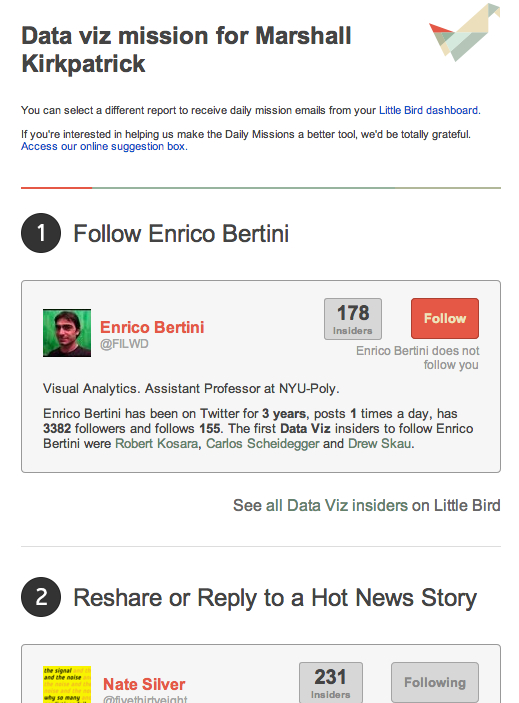Stepper coaches professionals on identifying key relationships they want to build, then developing new habits of offering whatever contributions they discover they can make to those key people and doing all of it publicly. That’s the TL;DR summary of this post, see the links below and please forgive me for such a long rambly bit of writing. I’m trying to get back in the habit a little but didn’t have the time to write something shorter.
This morning I was reading my Top Kanban Lovers Twitter list on my phone (exported from a Little Bird report on Kanban) and came across John Stepper’s week-old post Deepening relationships through contribution. (Good thing he re-shared an excerpt from it again a week later, something perhaps more of us would be wise to do.)
It was my first introduction to John, who describes his job as working “to change how people work at Deutsche Bank, using collaboration platforms, communities of practice, and public social media channels.” Awesome! I went on to read his posts on “Working out loudâ€: Your personal content strategy and Working Out Loud: the 12-week program, all of which I’d recommend highly enough that I’m blogging about them now when I should probably be cleaning my house before a brunch we’re hosting tomorrow morning.
Stepper explains “working out loud” using words from his freequent commenter Bryce Williams, social media veteran Stowe Boyd and social web tool founding father Dave Winer. Maybe you’re not hosting a brunch tomorrow and will feel inclined to read all those related posts. (If this kind of stuff is exciting to you, you might also like Harold Jarche’s Personal Knowledge Management and Susan Scrupski’s new Change Agents Worldwide, of which I am an advisor.) These people all seem to know each other, by the way, according to their Twitter relationships unearthed by DoesFollow.com. It’s a funny small world, social business/knowledge management thought leadership. But before today, I didn’t know John Stepper and maybe you didn’t either. Stepper and social sales leaders Matt Heinz and Jill Rowley don’t seem to know each other yet, so perhaps I can be a connector. For now, links in a blog post.
The end result is that Stepper coaches professionals on identifying key relationships they want to build, then building new habits of offering whatever contributions they discover they can make to those key people and doing all of it publicly.
That coaching sounds like incredible inspiration for what we’re doing at Little Bird, our data-driven technology for topic influencer discovery, engagement and for co-creation of the future of your field of interest. (As contrasted with Advocate Marketing, pay-for-play or other far less interesting ways to capture value from engaging with influential thinkers online. We don’t do that stuff, though you could use our data for it, I suppose.)
Little Bird’s efforts to make online engagement easier and more effective
Too often, our would-be customers say “ok, these are great people you discovered, but now what do I do with them?” We have tools for reading a highlight-reel of the most popular discussions among them, for cross-referencing their social connections, for searching their archival content and more. But for most people, this is still a stretch.
I wrote a post titled I Found the Leaders in My Field, Now What?, we put all the engagement tools on the front page of every Little Bird report in a new dashboard UI and we put a Joyride-type informational pop-up on every page.
But the thing that has helped the most has been our daily emails. Every day we send you an email from one of your reports with 1 top thinker you’re not yet connected to and 3 hot news items you should know about and consider sharing. Sometimes I get daily emails on Content Marketing or Social Selling for work, but sometimes I get emails on Cognitive Science or Data Viz, for fun. (continued below)

And it is super fun. People love those emails. But we need to do something more to help create “recipes” for influencer engagement, relationship building and capturing the huge huge value that can come from it. It’s like working out loud, but hopefully within ear shot of the kinds of world-leading experts in your field that you’d like to work with.
But it’s time to do more. We want Little Bird to be something more people engage with every day, like we do internally when we’re using our own technology to find things to talk about online, key people to engage with and to research the people who walk in our virtual front door interested in becoming a Little Bird customer. For some people the case for regular use is clear. I don’t want to brag, but some very smart early-adopter types love the heck out of it already. Just yesterday for example, global social business leader Luis Suarez of IBM said about Little Bird, “It is phenomenal how awesome it is.”
In order to build a thriving business though, and in order to spread the good word and good practice, the joy and discovery and connections, we need to make the technology more generally enabling.
We’ve got a number of ideas how we’re going to go about that, but the specifics are probably best left for another post, or multiple posts. For today I just wanted to put up a post saying: we know social media delivers huge value when people use it regularly to foster new business relationships. Here are some other awesome people who are doing work along these directions. This is something we’re working hard to build technology to support. Here’s what we’ve tried so far. More efforts are forthcoming.